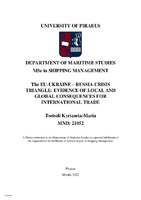The EU-Ukraine-Russia crisis triangle : evidence of local and global consequences for international trade
Το τρίγωνο κρίσης ΕΕ-Ουκρανίας-Ρωσίας : στοιχεία τοπικών και παγκόσμιων συνεπειών για το διεθνές εμπόριο

Master Thesis
Author
Τσέτσελη, Κυριαζέτα - Μαρία
Tsetseli, Kyriazeta - Maria
Date
2022Advisor
Polemis, DionisiosΠολέμης, Διονύσιος
View/
Abstract
After Russia, Ukraine is the second largest country in Europe. Historically, Ukraine
was a major part of the territories inhabited by the Rus (ancestors of modern
Russians), until the invasion of the Mongol Empire in the 13th century. Until the
beginning of the 20th century, various disturbances occurred. Although Ukraine was
an independent country from 1918 to 1920, it was then part of the Soviet Union until
the latter's collapse in 1991, when it became fully politically independent.
However, Ukrainian independence was never well received in Russia. In fact, the
Russians, due to the history of invasions, from the Mongols to the Nazi Germans,
consider Ukraine, like other neighboring countries, something like their "bastions".
The expansion of NATO during the 1990s and 2000s, with the inclusion of countries
such as Poland, Lithuania, Latvia and Estonia, makes the Russians believe that their
vital space is being encroached upon. And this is because they believe that the USA is
behind it, which has invaded foreign countries at least twice in the last twenty years:
in Afghanistan and Iraq.


